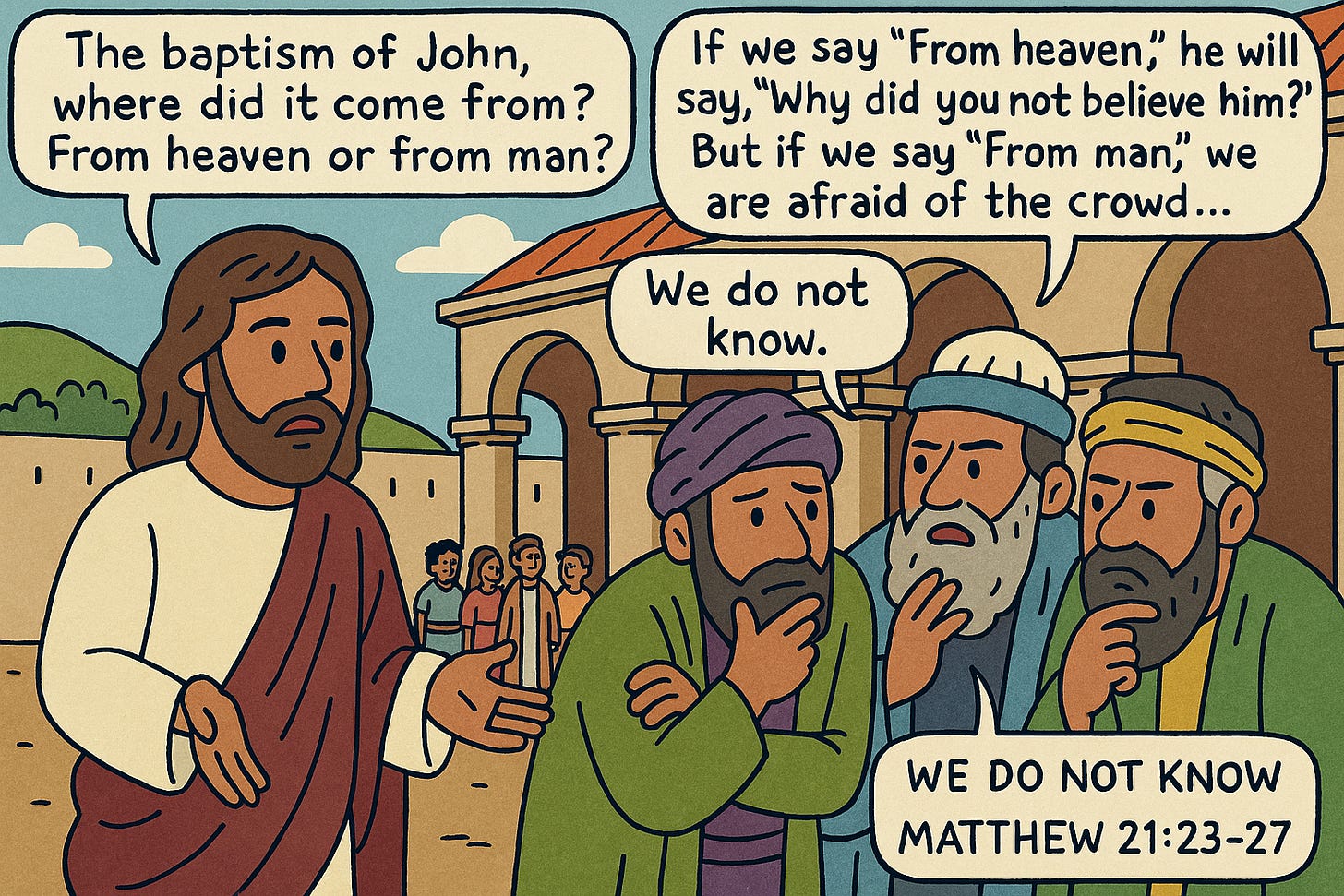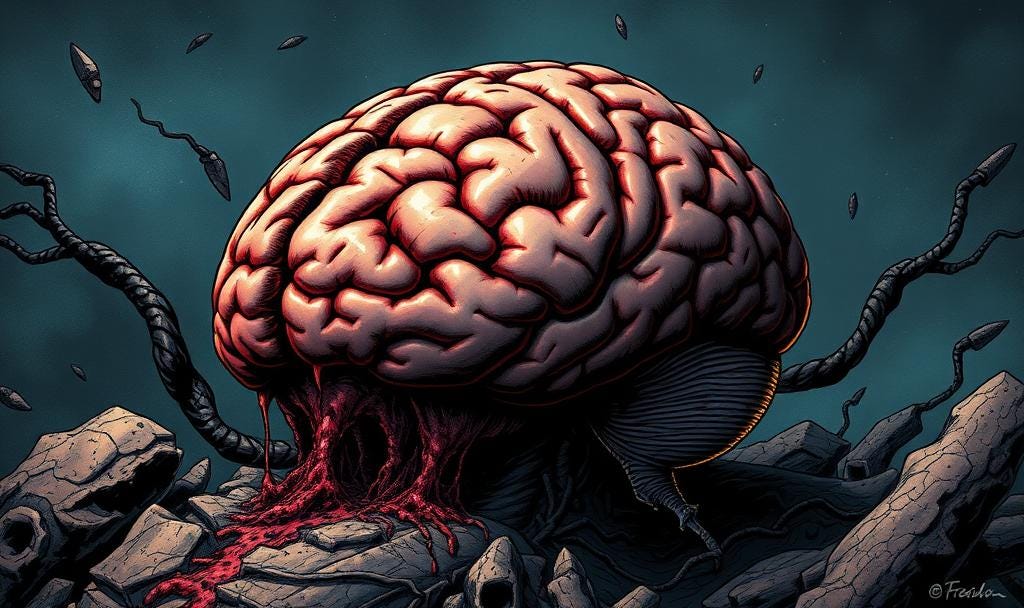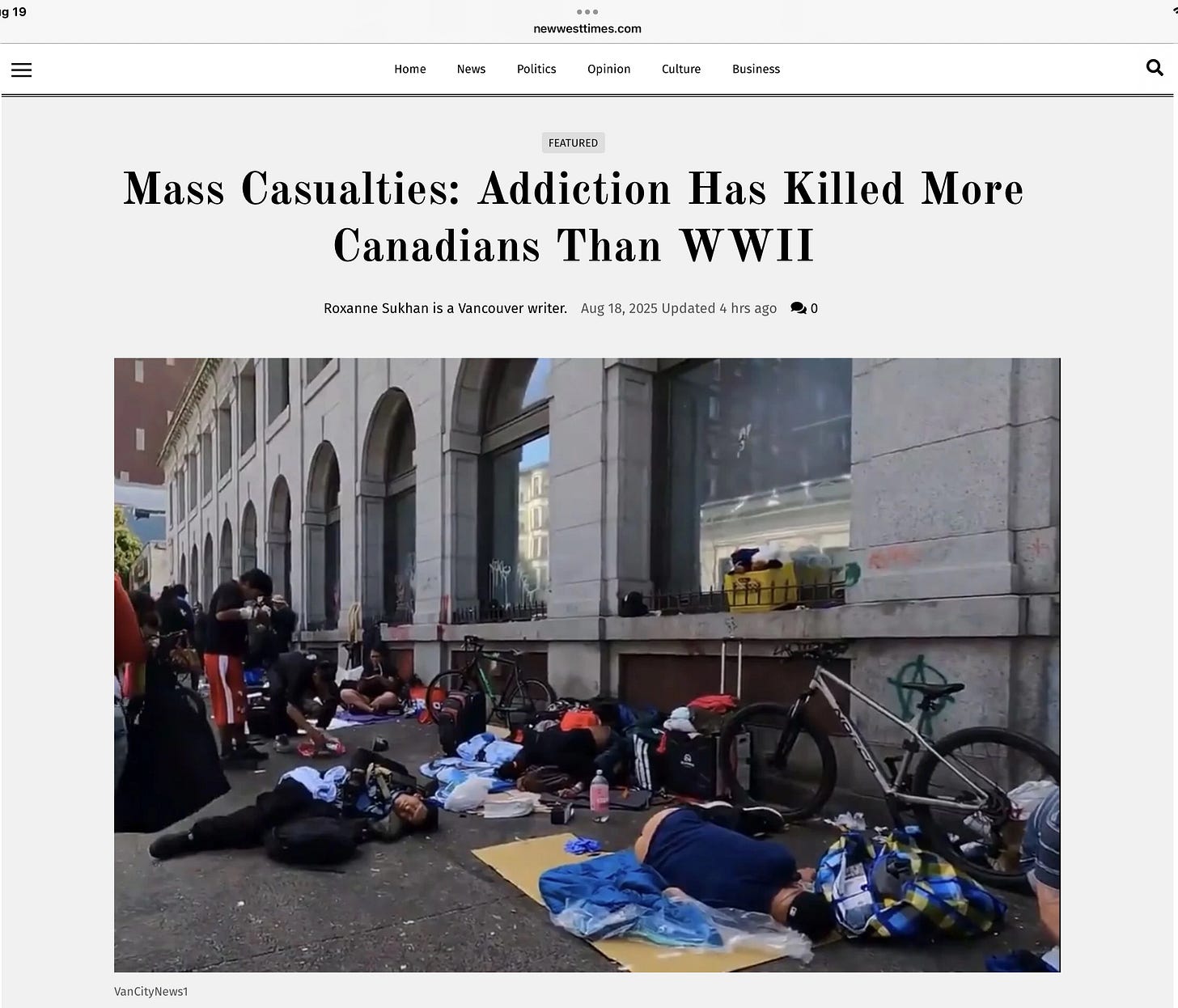Power and Authority :: Who is in Charge?
week in review for the week ending August 17, 2025
What’s the difference between power and authority? Who is really in charge? How can we wield power and limit authority to promote the greatest social good and minimise the harm committed by the corrupt and depraved? How can we push back on self idolatry and selfishness? Does universal good exist? When does tolerance become intolerable? Does the end justify the means? Who is in charge?
Today Pastor Jeremy delivered his sermon on Matthew 21:23-27.
Matthew 21:23-27 :: The Authority of Jesus Challenged
23 And when he entered the temple, the chief priests and the elders of the people came up to him as he was teaching, and said, “By what authority are you doing these things, and who gave you this authority?” 24 Jesus answered them, “I also will ask you one question, and if you tell me the answer, then I also will tell you by what authority I do these things. 25 The baptism of John, from where did it come? From heaven or from man?” And they discussed it among themselves, saying, “If we say, ‘From heaven,’ he will say to us, ‘Why then did you not believe him?’ 26 But if we say, ‘From man,’ we are afraid of the crowd, for they all hold that John was a prophet.” 27 So they answered Jesus, “We do not know.” And he said to them, “Neither will I tell you by what authority I do these things.
Pastor Jeremy began his sermon by talking about AI. He quoted Sam Altman saying “we’re building a brain for the world.” Will we still turn to faith in g-d as we progress technologically? Who’s really in charge? Pastor Jeremy read the passage from Matthew 21:23-27.
On what authority are you here, the temple elders and chief priests asked Jesus. Waiting for an opportunity to take Jesus down, the chief priests and elders couldn’t admit any error judgement or thinking on their part. That’s why they felt threatened by Him and wanted to cancel and kill Him.
What do we do when we face authority that challenges our thirst for power? We resort to cancel culture, deflecting, excuse making — we puff ourselves up to make our challengers seem smaller. Jesus weeps for those with hardened hearts.
Today’s liturgical reading focused on the subject of authority.
Who has the right to rule my life?
Pastor Jeremy made three points about the authority of Jesus:
Received, not seized
Based on heavenly will, not human opinion
Used for others not Himself
So, reader, what is the difference between power and authority? Ability or capacity to make stuff happen versus legitimacy to wield that ability or capacity. Power: ability to make stuff happen. Authority: the legitimacy to wield power. Jesus stewarded authority given to Him by G-d the father. He didn’t seize authority, he received it. Also worth noting, g-d gave us Free Will, and as such He has self limited His own power over us.
Pastor Jeremy spoke of pre-reformation times, when corrupt men seized authority over the masses, assuming that Divine authority they seized for selfishness ends. Vatican leaders created a system that required people to pay for indulgences. Wielded as a carrot or stick by elites, serving as a cudgel for Vatican leaders, salvation became a commodity trade or currency to acquire or earn, rather than something to receive through g-d’s grace. Martin Luther challenged the corrupt power structure of the Vatican. Wesley sought to reform the church by empowering the laity to participate in ministry and outreach through groups he trained and equipped and guided.
In the context of John Wesley, Pastor Jeremy mentioned Ephesians 4:12-13, “to equip the saints for the work of ministry, for building up the body of Christ, until we all attain to the unity of the faith…” When the parts of the body receive proper nourishment and attention, the whole body becomes healthier and stronger and has increased capacity to function as an integrated unit. Imagine the church as a body.
Pastor Jeremy described the flow of authority in Christianity as follows: father▶️son▶️church▶️individual. Jesus didn’t seize authority, he received it. We could argue for Jesus as the most loving person ever, and also remember He never compromised the values He embodied and carried, even to the point of dying for them. In contrast, the temple elders and chief priests prioritised human opinion over the conviction of Divine truth.
Pastor Jeremy mentioned the ten commandments of secular culture, which he found in the course of his research for this sermon. How many of these edicts do we find in Wokerati progressivism?
Be true to yourself above all else
Do not judge anyone except those who judge
Pursue happiness as life’s highest goal
Define your own truth and identity
Cancel those who offend your values
Put career success and wealth before all
Use technology to solve every problem
Worship entertain and distraction
Tolerate all lifestyles except intolerance
Seek comfort + convenience + safety at any cost
In his challenge of cancel culture Pastor Jeremy mentioned Colossians 3:12-15.
12 Put on then, as God's chosen ones, holy and beloved, compassionate hearts, kindness, humility, meekness, and patience,13 bearing with one another and, if one has a complaint against another, forgiving each other; as the Lord has forgiven you, so you also must forgive. 14 And above all these put on love, which binds everything together in perfect harmony. 15
In challenging relativism Pastor Jeremy mentioned Isaiah 5: 20. As the pastor preached on Isaiah waxing poetically about evil made good and good made evil, my mind went to the story of Sodom and Gomorrah. It went to the depravity of persecution we see in our society today — for example the persecution of Amy Hamm. Also, the glorification and romanticisation of Hamas and the worldwide neglect of the Israeli hostages and the way Israelis have had to listen to brainwashed masses blame them for the worst pogrom against them to happen since the Holocaust.
20 Woe to those who call evil good
and good evil,
who put darkness for light
and light for darkness,
who put bitter for sweet
and sweet for bitter!
Reader, recall the reason g-d destroyed Sodom and Gomorrah — because of institutionalised cruelty and inhospitality, because of neglecting the needs of the poor and suffering and needy became normalised, because moral depravity became mandated, taking the place of moral goodness. Sodom and Gomorrah became a place where the people chose self idolatry over g-dcentricity. The leaders of Sodom and Gomorrah used their power to serve themselves at the expense of others, particularly those most in need and the most marginalised. The corrupt of Sodom emptied others to fill themselves, they hijacked moral authority to seize power for themselves. In contrast, Jesus derives authority from g-d—service to and not power over others motivates Him. How do our leaders lead? Do they serve those whom they lead? Do they serve themselves at the expense of those whom they lead? What purpose do power and authority have in the world? Pastor Jeremy mentioned Philippians 2:7-8, reminding us of the servitude with which Jesus lead — emptying Himself to co-suffer with humankind.
7 but emptied himself, by taking the form of a servant, being born in the likeness of men. 8 And being found in human form, he humbled himself by becoming obedient to the point of death, even death on a cross.
Sometimes when we lead, we must know when to surrender to our purpose—leadership servitude. Humility and discernment a great leader make. Pride and foolishness a terrible leader make. Think again of the elders and chief priests, who could not bring themselves to surrender control, to humble their egos and choose the right path even though it required going against the popular opinion. Appeasement rarely works, does it? What did Churchill say? Appeasement is feeding the crocodile, hoping he will eat you last.
So, how do we navigate power and authority and leadership to achieve the most morally sound, righteous and g-dcentric ends for humanity? Machiavellian politics seek to dominate, tear down, divide. Morally good leaders use their power and authority to serve others. Corruption inspires leaders to serve themselves at the expense of those whom they lead, and who rely upon them. Why do so many people resent Wokerati progressivism? Because it reverses good and evil, because it concentrates power, and that power serves itself at the expense of the masses, and that includes making a lie the true, and making the truth a lie.
Below the line you’ll find this week’s essays. My New Westminster Times column for this will go live very soon, hopefully Monday, (summer time often means things take a bit longer than normal to execute themselves). When it’s published, I’ll add the link here.
Now’s the Time for Joy
Reader, I feel joyless. I hate this feeling quite a lot, and I want Joy RIGHT NOW.
The Brain-Rot of Progressivism
Progressivism rots and devours brains. When I sit down and think about the nonsense the Woko Haram expect the rest of us to swallow, it blows my mind. Many people have become fed up, and the number of fed up grows daily. The mask continues to slip, revealing the depravity and narcissism of the Wokerati. Woketopia as an objective resembles a sick and cra…
Mass Casualties: Addiction Has Killed More Canadians Than WWII









